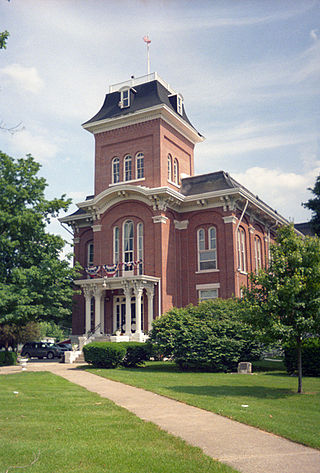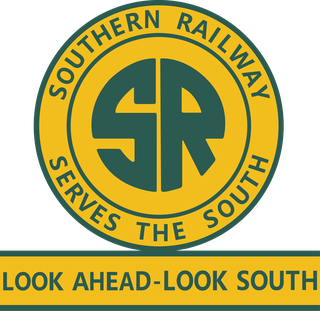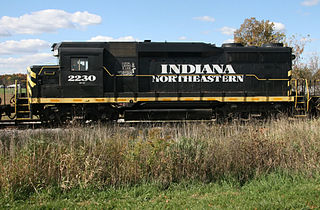
Vermilion County is a county in the eastern part of the U.S. state of Illinois, between the Indiana border and Champaign County. It was established in 1826 and was the 45th of Illinois' 102 counties. According to the 2020 United States census, it had a population of 74,188. It contains 21 incorporated settlements; the county seat and largest city is Danville.

Iroquois County is a county located in the northeast part of the U.S. state of Illinois. According to the 2020 United States Census, it has a population of 27,077. It is the only county in the United States named Iroquois. The county seat is Watseka. The county is located along the border with Indiana.

The New York Central Railroad was a railroad primarily operating in the Great Lakes and Mid-Atlantic regions of the United States. The railroad primarily connected greater New York and Boston in the east with Chicago and St. Louis in the Midwest, along with the intermediate cities of Albany, Buffalo, Cleveland, Cincinnati, Detroit, Rochester and Syracuse. New York Central was headquartered in New York City's New York Central Building, adjacent to its largest station, Grand Central Terminal.

The Monon Railroad, also known as the Chicago, Indianapolis, and Louisville Railway from 1897 to 1971, was an American railroad that operated almost entirely within the state of Indiana. The Monon was merged into the Louisville and Nashville Railroad in 1971, and much of the former Monon right of way is owned today by CSX Transportation. In 1970, it operated 540 miles (870 km) of road on 792 miles (1,275 km) of track; that year it reported 1320 million ton-miles of revenue freight and zero passenger-miles.

The Southern Railway was a class 1 railroad based in the Southern United States between 1894 and 1982, when it merged with the Norfolk and Western Railway (N&W) to form the Norfolk Southern Railway. The railroad was the product of nearly 150 predecessor lines that were combined, reorganized and recombined beginning in the 1830s, formally becoming the Southern Railway in 1894.

The Grand Trunk Western Railroad Company was an American subsidiary of the Grand Trunk Railway, later of the Canadian National Railway operating in Michigan, Illinois, Indiana, and Ohio. Since a corporate restructuring in 1971, the railroad has been under CN's subsidiary holding company, the Grand Trunk Corporation. Grand Trunk Western's routes are part of CN's Michigan Division. Its primary mainline between Chicago and Port Huron, Michigan serves as a connection between railroad interchanges in Chicago and rail lines in eastern Canada and the Northeastern United States. The railroad's extensive trackage in Detroit and across southern Michigan has made it an essential link for the automotive industry as a hauler of parts and automobiles from manufacturing plants.

The Michigan Central Railroad was originally chartered in 1832 to establish rail service between Detroit, Michigan, and St. Joseph, Michigan. The railroad later operated in the states of Michigan, Indiana, and Illinois in the United States and the province of Ontario in Canada. After about 1867 the railroad was controlled by the New York Central Railroad, which later became part of Penn Central and then Conrail. After the 1998 Conrail breakup, Norfolk Southern Railway now owns much of the former Michigan Central trackage.

The Bloomer Shippers Connecting Railroad, headquartered in Gibson City, Illinois, is a Class III railroad serving agricultural communities in east-central Illinois.

The Illinois Terminal Railroad Company, known as the Illinois Traction System until 1937, was a heavy duty interurban electric railroad with extensive passenger and freight business in central and southern Illinois from 1896 to 1956. When Depression era Illinois Traction was in financial distress and had to reorganize, the Illinois Terminal name was adopted to reflect the line's primary money making role as a freight interchange link to major steam railroads at its terminal ends, Peoria, Danville, and St. Louis. Interurban passenger service slowly was reduced, ending in 1956. Freight operation continued but was hobbled by tight street running in some towns requiring very sharp radius turns. In 1956, ITC was absorbed by a consortium of connecting railroads.
The Porter Subdivision is a railroad line owned by CSX Transportation in the Chicago, Illinois, area. Formerly a part of the main line of the Michigan Central Railroad, it now connects CSX's former Baltimore and Ohio Railroad line and the Chicago Fort Wayne and Eastern Railroad from the east with the Indiana Harbor Belt Railroad towards Blue Island, Illinois.
The Indiana Rail Road is a United States Class II railroad, originally operating over former Illinois Central Railroad trackage from Newton, Illinois, to Indianapolis, Indiana, a distance of 155 miles (249 km). This line, now known as the Indiana Rail Road's Indianapolis Subdivision, comprises most of the former IC/ICG line from Indianapolis to Effingham, Illinois; Illinois Central successor Canadian National Railway retains the portion from Newton to Effingham. INRD also owns a former Milwaukee Road line from Terre Haute, Indiana, to Burns City, Indiana, with trackage rights extending to Chicago, Illinois. INRD no longer serves Louisville, Kentucky, and the Port of Indiana on the Ohio River at Jeffersonville, Indiana, through a haulage agreement with the Louisville & Indiana Railroad (LIRC).

The Vermilion Valley Railroad is a 5.9-mile (9.5 km) short-line railroad that operates across the Indiana-Illinois state line, connecting the Flex-N-Gate Corporation facility west of Covington, Indiana with CSX Transportation in Danville, Illinois.
The Kankakee Belt Route is the nickname for the Illinois Division of the New York Central Railroad, which extended from South Bend, Indiana, through Kankakee, Illinois, and westward to Zearing, Illinois. This line was sometimes referred to as the "3 I Line", in reference to a corporate predecessor, the "Indiana, Illinois & Iowa Railroad". That portion of the line west of Kankakee to Moronts, Illinois, roughly parallels the Illinois River in Northern Illinois and was used, in large part, to transport corn toward eastern markets. See Kankakee Outwash Plain

The Central Railroad Company of Indiana is a Class III short-line railroad that owns 92 miles (148 km) of track between Cincinnati, Ohio, and Shelbyville, Indiana, with trackage rights on CSX to Indianapolis, Indiana. CIND interchanges with CSX, Indiana & Ohio Railway, and Norfolk Southern in Cincinnati, and in North Bend, Ohio, with CSX; an Indiana & Ohio branchline splits from the CIND line at Valley Junction, a railroad location near Hooven, Ohio.

The Indiana Northeastern Railroad is a Class III short line freight railroad operating on nearly 130 miles (210 km) in southern lower Michigan, northeast Indiana and northwest Ohio. The Indiana Northeastern Railroad Company began operations in December 1992 and is an independent privately owned company. As of 2017 the railroad hauled more than 7,000 carloads per year. Commodities moved by the railroad include corn, soybeans, wheat and flour. It also handles plastics, fiberboard, aluminum, copper, coal, perlite, stone, lumber, glass, rendering products, as well as agricultural fertilizers and chemicals.
The following is a brief history of the North American rail system, mainly through major changes to Class I railroads, the largest class by operating revenue.

The Wabash Railroad was a Class I railroad that operated in the mid-central United States. It served a large area, including track in the states of Ohio, Indiana, Illinois, Iowa, Michigan, and Missouri and the province of Ontario. Its primary connections included Chicago, Illinois; Kansas City, Missouri; Detroit, Michigan; Buffalo, New York; St. Louis, Missouri; and Toledo, Ohio.

The Vandalia Railroad Company was incorporated January 1, 1905, by a merger of several lines in Indiana and Illinois that formed a 471-mile railroad consisting of lines mostly west of Indianapolis.














